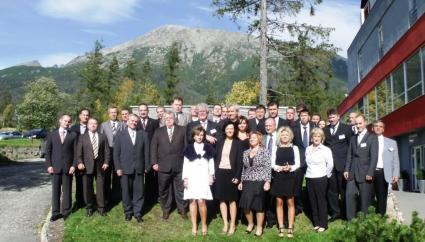The judicial officer, essential economic element of a State
Let us recall that UIHJ-EuroDanube is composed of the following countries: Bulgaria, Czech Republic, Estonia, Hungary, Latvia, Lithuania, FYRO-Macedonia, Poland, Romania, Slovakia and Slovenia.
In his opening speech, Jozef Risian, president of the National Chamber of the judicial officers of Slovakia, mentioned the problems currently occurring in his country, in particular criticisms and complaints addressed against the profession. The profession needs to gain the confidence of the civil society. “This is why the subject of ethics and deontology appear in the topic of this meeting” he said. Then he presented the other topics having to be approached, amongst which the proposals relating to the future actions of UIHJ-EuroDanube, the possibility of creating a uniform statute, as in Africa, but also the concrete definition of actions to be started.
Daniel Hudak, State Secretary Justice of Slovakia, pointed out that the judicial officer has a role in the civil society. The State delegated a parcel of the public authority to the judicial officers as public agents. For Mr. Hudak, it is unimaginable that this profession is deprived of ethical rules and deontology. These principles must appear in a Code of conduct. If the judicial officer appears as the representative of the creditor, he is above all impartial. This independence is necessary since the judicial officer is responsible for his conduct on an everyday basis and that he must be sanctioned for any failure. The State Secretary also mentioned reforms aiming at allowing the electronic distribution of enforcement cases. Lastly, he was pleased with the good communication which exists between the ministry for justice and the profession in Slovakia, which makes it possible to locate and solve problems quickly.
Then Leo Netten, president of the UIHJ, presented the broad outlines of recommendations 16 and 17 of 2003 of the Council of Europe. He indicated that the selected topic aims at giving again confidence in the judicial officer. “In a crisis period, the judicial officer is not only an essential element of the Rule of law, but also an essential economic element of a State” he added. “Within the framework of the creation of a great occupation of judicial officer, we need all the national chambers”.
Michal Redelbach, secretary of UIHJ-EuroDanube, drew up a two years report of existence of this structure. He pointed out the conferences of Sopot (Poland) and Budapest (Hungary). He also evoked the international symposium of Sibiu (Romania) where was presented a European directive draft on a document initiating proceedings in Europe.
Minimal standards of ethics and deontology
The representatives of the national chambers of judicial officers then gave a report of the activities and evolutions in their countries.
In Hungary, the procedure of order for payment in commercial matters was presented. This procedure makes it possible to relieve commercial jurisdictions of a whole load of disputes, as it is the case in many States. Electronic communication is envisaged to accelerate and simplify more exchanges of information.
Marius Crafcenco, president of the National Chamber of the judicial officers of Romania underlined the interest of the UIHJ-EuroDanube seminars which make it possible to reinforce the occupation of judicial officer, to raise his prestige and to contribute to his independence. He wished that the profession be standardized and that there exists one body of judicial officers charged to carry out legal decisions. He regretted that in Romania the procedure of execution can be the subject of as many possibilities of disputes having for sole object to slow down the process.
Following the example of his Rumanian counterpart, Antonio Kostanov, president of the National Chamber of the judicial officers of FYRO-Macedonia, insisted on the importance of UIHJ-EuroDanube seminars. He informed the participants of the creation in his country of a panel of teachers, judges and judicial officers to reinforce the field related to the execution of the legal decisions. He also stated that FYRO-Macedonia took part in the reform project in the Balkans (BERP- Balkans Enforcement Reforms Project) and that several meetings had been held in Skopje.
As regards Poland, Michal Redelbach, vice-president of the National Chamber of the judicial officers and secretary of UIHJ-EuroDanube, declared that a E-justice project was in hand in his country. In 2010, a reform of the civil procedure will come into effect which will emphasize on dematerialization in particular of banking services. He recalled the memory of Jan Treder, in charge of the Currenda Company, and who passed away in January 2009. Michal Redelbach also mentioned the problems relating to the application of the VAT in the procedures of execution in Poland.
In the Czech Republic, the president indicated that the number of judicial officers amounts to one hundred and twenty through sixty offices. He declared himself conscious of the importance of improving the image of the judicial officers.
Then the debates were centered around computerization and of its incidences for the occupation of judicial officer. For example, in the Czech Republic, there is a central register in which can be mentioned all enforcement procedures against the debtors. The question of the transmission by electronic way was also tackled, each institution being held to have an e-mail address.
On the question of ethics, it was decided at the conclusion of the meeting to adopt a charter on minimal standards of ethics and deontology applicable to all countries of the EuroDanube zone.
Lastly, the UIHJ-EuroDanube charter was modified and a position of vice-secretary general was created. Juraj Potkoniky (Czech Republic) was appointed general secretary and Zsolt Orell (Hungary), vice-general secretary.


